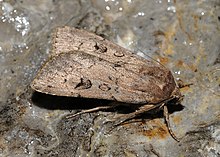| Graphiphora augur | |
|---|---|

| |
| Scientific classification | |
| Domain: | Eukaryota |
| Kingdom: | Animalia |
| Phylum: | Arthropoda |
| Class: | Insecta |
| Order: | Lepidoptera |
| Superfamily: | Noctuoidea |
| Family: | Noctuidae |
| Genus: | Graphiphora |
| Species: | G. augur |
| Binomial name | |
| Graphiphora augur (Fabricius, 1775) | |
| Synonyms | |
| |
Graphiphora augur, the double dart or soothsayer, is a moth of the family Noctuidae. The species was first described by Johan Christian Fabricius in 1775. It is found in all of Canada and most of the northern parts of the United States, south in the west to California and New Mexico. It is also found throughout Eurasia, from the British Isles and Scandinavia to Siberia and Japan.
Technical description and variation
For a key to the terms used, see Glossary of entomology terms.The wingspan is 35–42 mm. Forewing uniform brownish grey with a reddish tinge; stigmata concolorous, black edged; claviform narrow; orbicular variable, round, or flattened, sometimes prolonged to touch inner line; reniform with outer edge swollen in the middle, sometimes followed by a dark shade: hindwing a little paler. Form hippophaes is a grey form with the reddish tinge wanting; — helvetina Knaggs is a pale blurred form with obscure markings, and the fringe of hindwing pink.

Biology
Adults are on wing from June to August depending on the location. There is one generation per year.
The larva vary from purplish brown to greenish grey with a double row of whitish spots on the dorsum and oblique dark streaks; a dark brown blotch across segment 12, swollen at each end, and edged behind with pale. The larvae feed on various trees and shrubs, including Betula, Salix caprea, Salix phylicifolia, Salix cinerea, Populus tremula, Populus balsamifera, Ribes, Rosa species (including Rosa acicularis, Syringa vulgaris and Lonicera caerulea).
Subspecies
- Graphiphora augur augur (Eurasia)
- Graphiphora augur haruspica (Canada, northern United States)
- ?Graphiphora augur sierrae
- ?Graphiphora augur inopinatus
References
- Seitz, A. Ed., 1914 Die Großschmetterlinge der Erde, Verlag Alfred Kernen, Stuttgart Band 3: Abt. 1, Die Großschmetterlinge des palaearktischen Faunengebietes, Die palaearktischen eulenartigen Nachtfalter, 1914
- Robinson, Gaden S.; Ackery, Phillip R.; Kitching, Ian J.; Beccaloni, George W.; Hernández, Luis M. (2010). "Search the database - introduction and help". HOSTS - A Database of the World's Lepidopteran Hostplants. Natural History Museum, London.
External links
- Kimber, Ian. "73.351 BF2114 Double Dart Graphiphora augur (Fabricius, 1775)". UKMoths. Retrieved 30 June 2019.
- Savela, Markku. "Graphiphora augur (Fabricius, 1775)". Lepidoptera and Some Other Life Forms. Retrieved June 30, 2019. Taxonomy
- McLeod, Robin (December 17, 2015). "Species Graphiphora augur - Double Dart - Hodges#10928". BugGuide. Retrieved June 30, 2019.
- "933563.00 – 10928 – Graphiphora augur – Double Dart Moth – (Fabricius, 1775)". North American Moth Photographers Group. Mississippi State University. Retrieved June 30, 2019.
- Lepiforum e.V.
| Taxon identifiers | |
|---|---|
| Graphiphora augur |
|
This Noctuinae-related article is a stub. You can help Misplaced Pages by expanding it. |